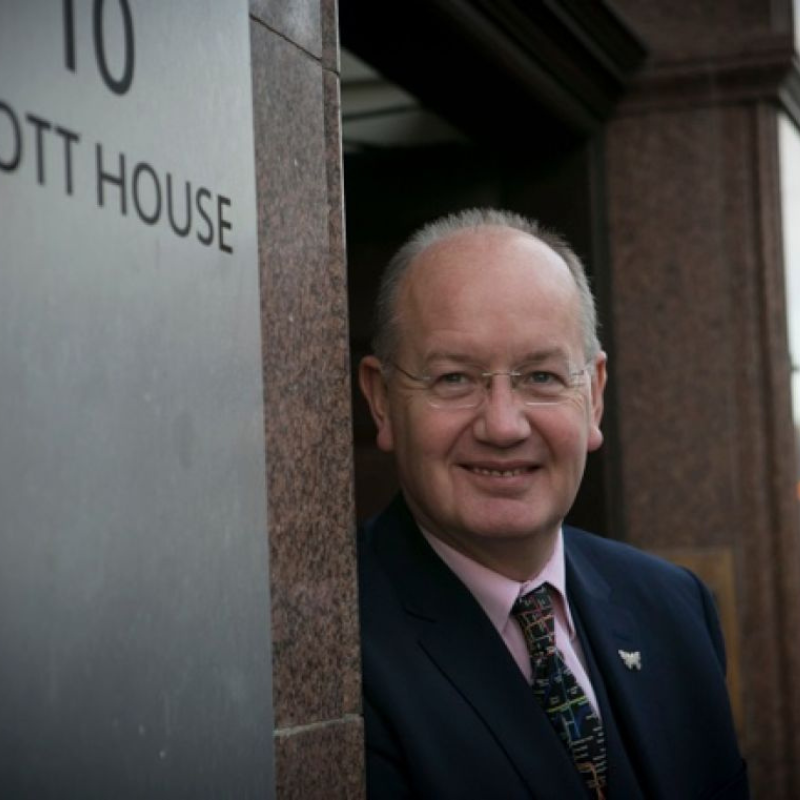Effective regulation in the public, private and third sectors is essential in guaranteeing the quality services and products Scottish consumers receive. However, public sector budgets are under threat. Private sector businesses are competing for consumers who have increasingly tight budgets. Third sector organisations face another period of acute funding uncertainty. How can bodies across all three sectors deliver compliance in regulation and scrutiny in challenging circumstances? The challenge is to comply with current expectations, prepare for what is coming next and still deliver what consumers expect. The question is, how?
In 2006 the Crerar Review reported its recommendations on how Scotland's systems of regulation, audit, and inspection and complaints handling for public services could be improved. The 2014 Regulatory Reform (Scotland) Act aimed to further improve the way regulation is developed and applied in order to deliver consistent and proportionate regulation. Now, the First Minister has committed the Scottish Government to a new programme for regulatory reform in the Programme for Government published on 5th September 2023.
After almost a quarter century of the Scottish Parliament, 17 years since the Crerar Review and 9 years following the Regulatory Reform Act, what has changed in how we regulate and what is expected in accountability? What new demands are emerging from consumers sharing knowledge through legally enforcable information rights? How has the rise of social media in spreading information and disinformation changed the regulatory terrain? In what way has increased consumer and citizen willingness to participate in driving service change altered the challenges for service providers? What changes can regulators and regulated expect from regulatory reform?
This conference discusses Scotland's regulators and regulatory regimes and the approach in Scotland to the regulation of public services, markets and companies. It examines how disruptive technology and data, changing consumer demands and developing trends in regulation are combining to affect accountability, service delivery and improvement.
Who regulates and how? What is the purpose of regulation? How can regulators strike a balance between proportionality, effective scrutiny and compliance? What are the key drivers for reform? How can service providers and businesses increase compliance levels within budgetary constraints?
The conference is structured to discuss regulation in Scotland in three parts:
Benefits of attending
Who should attend

Former Scottish Public Services Ombudsman and Scottish Information Commissioner

Director
Playfair Scotland

Chief Executive
Consumer Scotland

Chairman
Scottish Government independent Regulatory Review Group

Partner
Harper Macleod LLP

Information Governance Solicitor
The General Teaching Council for Scotland

Head of ICO Regions
Information Commissioner's Office

Director
O'Donnell Associates
09:10 Chair's opening remarks
Donald Anderson, Director, Playfair Scotland
DA_Anderson
PlayfairScotla3
Session 1: Regulation and scrutiny in Scotland: the strategic picture
09:15 Keynote Speaker
Professor Russel Griggs, Chairman, Scottish Government independent Regulatory Review Group
scotgov
09:30 Regulation, audit, inspection and complaints in public services
Rosemary Agnew, Scottish Public Services Ombudsman
SPSO_Ombudsman
09:45 Question and answer session
10:00 Comfort break
Session 2: Regulators, public services and markets
10:15 Regulatory decision making - legal perspectives 1
Fiona Killen, Partner, Harper Macleod LLP
HarperMacleod
10:30 Regulatory decision making - legal perspectives 2
Jennifer Jack, Partner, Harper Macleod LLP
HarperMacleod
10:45 Scrutiny, Accountability and Good Governance
Mark O'Donnell, Director, O'Donnell Associates
odonnassociates
11:00 Question and answer session
11:15 Comfort break
Session 3: What's coming next for regulators and regulated?
11:30 Improving outcomes for consumers
Sam Ghibaldan, Chief Executive, Consumer Scotland
Consumer_Scot
11:45 Data protection, accountability and regulation
Ken Macdonald, Head of ICO Regions, Information Commissioner’s Office
ICOnews
12:00 Question and answer session
12:15 Chair's closing remarks
Donald Anderson, Director, Playfair Scotland
DA_Anderson
PlayfairScotla3

Rosemary Agnew
Former Scottish Public Services Ombudsman and Scottish Information Commissioner
Rosemary Agnew took up the post of Scottish Public Services Ombudsman on 1 May 2017, leaving office in 2025. Immediately prior to this she was the Scottish Information Commissioner (2012-2017).
Since 2001, Rosemary has held various roles in relation to public sector complaints, including with the Scottish Legal Complaints Commission and the Local Government Ombudsman in the UK.
Rosemary's career has seen a committment to transparent, sustainable improvement in Scottish public services - most recently seeing complaints and what is learned from them as an integral part of the improvement landscape.

Donald Anderson
Director
Playfair Scotland
Prior to setting up the company, Donald worked as Director of the PPS Scotland Office for nine and a half years, as a company with specific expertise in inward investment, government and public service issues. Donald has worked on projects with an investment value more than £4billion in recent years. His work has covered most of Scotland working in 28 of the 32 local authority areas.
Donald was a councillor for over 20 years, working extensively on delivering economic development and investment and was one of the key public sector figures who helped Edinburgh become the strongest city economy in the UK outside London. Donald helped the city’s Festivals to thrive and conceived and created Edinburgh’s Christmas Festival which brings nearly £200million into the city each year. Donald was unashamedly pro-development during his period in office.

Sam Ghibaldan
Chief Executive
Consumer Scotland
Sam Ghibaldan has held a number of senior roles in government, consumer advocacy and utilities regulation.
His recent roles include:
Programme Director for Consumer Scotland, leading to its establishment
Director of the Customer Forum, focused on building the Strategic Review of Scottish Water around customers’ expectations
Member of Scottish Power Energy Networks’ Customer Engagement Group
Head of the Consumer Futures Unit in Citizens Advice Scotland
As a Senior Special Adviser in the Scottish Government between 1999 and 2007, he led the adviser teams of successive Deputy First Ministers.
Before that he worked in a corporate communications consultancy, on the Scottish devolution referendum campaign in 1997, and as a researcher in the House of Commons.

Russel Griggs (Professor)
Chairman
Scottish Government independent Regulatory Review Group
Chair, South of Scotland Enterprise - Professor Russel Griggs OBE was also Chair of SOSEP, the body that created SOSE.
Russel Chairs the Scottish Government’s independent Regulatory Review Group which advises and work on better regulation in Scotland; is a member of the Scottish Government’s Aquaculture Council; is Chair of Scottish Mines Restoration Trust a charity: is a Board member and senior Independent Director on the oversight Board for the Comptroller and Auditor General for the States of Jersey; and is a Board member of Lenlyn Holdings Ltd, a financial services company.
He is honorary Professor of the University of Glasgow, was an associate Professor at Boston University and a member of the board of the Business School at Georgia Southern University. He was awarded an OBE in the Queen’s Birthday Honours list in 2008 for services to Scottish industry.

Jennifer Jack
Partner
Harper Macleod LLP
Jennifer leads the Harper Macleod public law litigation and public inquiries practice across Scotland. She is an experienced lawyer who leads a team of lawyers focussing on public, administrative and constitutional law; public inquiries; civil liberties & human rights; and disputes involving the public sector and government (national and local). Jennifer works closely with her clients, taking a pragmatic approach to finding the best solutions for them.
With long-standing recognised specialist expertise in public law and disputes involving public bodies (including government), Jennifer has significant experience of advising and representing clients on public, regulatory and constitutional law issues, including in Judicial Review and Appeals against decisions of a wide range of public authorities. She draws upon this practical litigation experience when advising clients on statutory/regulatory obligations and wider reputation management.
Jennifer has an outstanding record of success in winning cases for government bodies, regulators, companies, campaign groups and individuals, in court and representing their interests at public inquiries. She is one of a handful of Scottish solicitors with experience of litigating in the Scottish Courts, UK Supreme Court and Court of Justice of the European Union.
Jennifer advises clients on legislation and statutory interpretation, the powers and duties of public bodies, the art of getting decisions right first time and representing clients in situations when decision-making is questioned. The setting might be a Board/committee meeting, investigation, tribunal, court or public inquiry. Decisions could relate to competition /state aid/ procurement, planning/ environmental/ climate change issues, data protection & information law, education matters, looked-after children/ vulnerable adults/ homeless accommodation, or other areas where decisions are made that affect individuals, businesses and communities. Jennifer’s expertise is found in a thorough understanding of the relevant legislative/ regulatory/ procedural frameworks and how to identify and address areas susceptible to challenge.
Jennifer’s thorough understanding of the often legally complex and politically sensitive issues affecting those operating within and engaging with the public sector allows her to give insightful advice, tailored to clients’ specific situations and needs.
She is a ‘Top Ranked Lawyer’ by Chambers UK Guide to the Legal Profession in Administrative & Public Law (13 years of ranking) and a ranked lawyer Leading Individual” in Civil Liberties & Human Rights, Environment: Climate Change (UK-wide) and Parliamentary & Public Affairs. She is also recommended by The Legal 500 in Charities & Not-for-Profit, EU & Competition, Environment, Local Government and Planning. Jennifer is also the only Scottish lawyer ranked by Chambers UK Guide for work in the UK-wide specialist field of Climate Change.

Fiona Killen
Information Governance Solicitor
The General Teaching Council for Scotland
Fiona is one of the most highly-regarded lawyers in Scotland for public, parliamentary and administrative law. She has a deep working knowledge and expertise across a range of legal areas including public and regulatory law, data protection, freedom of information, human rights, corporate governance and parliamentary affairs.
With a background in both contentious and non-contentious matters, she is highly experienced in a wide range of sectors, with a particular focus on education as well as the public sector.
She has in-depth knowledge and first-hand insight of how Governments and Parliaments work on a day-to-day basis, alongside extensive experience of legislative procedures and public sector governance.
She has worked in the Scottish Parliament, UK Parliament and the US Senate in legal and political roles, and in higher education. She was a member of the Scottish Government’s Human Rights Leadership Task Force and sits on the Law Society of Scotland’s sub-committees on constitutional law, human rights, privacy law and its freedom of information working group.
Fiona is ranked by Chambers in Band 1 for both Administrative & Public Law and Parliamentary & Public Affairs. She is ranked within Legal 500’s Hall of Fame for Parliamentary & Public Affairs, and as a Leading Individual for Education Law.

Ken Macdonald
Head of ICO Regions
Information Commissioner's Office
Ken Macdonald, Head of ICO Regions, leads our Scotland, Wales and Northern Ireland offices. A graduate of Edinburgh (MA) and Aberdeen (PhD) universities, Ken joined the ICO in 2005 after a career in the higher education, private consultancy and local authority sectors.
Scotland has its own Information Commissioner who regulates the Freedom for Information (Scotland) Act which covers Scottish public authorities. Because of this, the main focus of our Scottish office is data protection, for which the ICO is the sole regulatory body in Scotland. However, the ICO does have regulatory power under the Freedom of Information Act for UK public authorities based in Scotland. These include:
BBC Scotland (in relation to its public functions); and
The Northern Lighthouse Board.

Mark O'Donnell
Director
O'Donnell Associates
Mark has been Chief Executive of 3 well known Scottish Charities – Chest Heart & Stroke Scotland, Sight Scotland/Sight Scotland Veterans and Age Scotland. He is currently Chair of the UK medical research charity Action Against AMD and a Trustee of Heart Research UK, as well as sitting on Marie Curie’s UK Policy and Research Committee and Scottish Advisory Board. Previous Trustee roles include the Scottish Council for Voluntary Organisations, Visionary UK and the Scottish Drugs Forum. He has also been a career mentor for the Mastercard Foundation Fellowship Scheme at the University of Edinburgh.
He has been responsible for a wide range of strategic and operational leadership functions in his career including complex regulated services in health, social care and special educational needs, community-based services, commercial and social enterprises, policy and research. He has extensive experience in media and campaigning work as well as direct leadership experience of service reconfiguration, stakeholder engagement, rebranding exercises and the development of co-created organisational development and people strategies.
He also has valuable experience in Executive-team roles in the NHS in Scotland, as Head of Planning, Performance and Estates at the Scottish Ambulance Service and Interim Director of Planning and Equalities at NHS Health Scotland. He also spent 5 years on secondment to the Scottish Government, taking on Deputy Director roles in Health Improvement and then Healthcare Planning and Quality and a spell as Acting Policy Director in health and social care.
Mark is a member of the Institute of Directors and has an MSc in Social and Public Policy, an MA (Hons) in Politics and a Professional Certificate in Management.
This conference will take place online.
How to book
You can book to attend, or order the video only, in 3 ways:
Conference fees
Group discount – organisations booking 3 or more delegates will receive every third delegate place free of charge (please complete further forms if necessary)
Payment
We do not currently accept payments online and will send you an invoice.
You have the option of paying by BACS or card.
BACS details will be included on the invoice.
If you wish to pay by card, please tick the appropriate box on the booking form and a member of our staff will contact you by telephone to take the payment. Alternatively you may call 0131 556 1500.
Terms and conditions
By placing this booking, you agree to the full terms and conditions found via the link at the foot of our website.
Book delegate places or purchase video recording.

